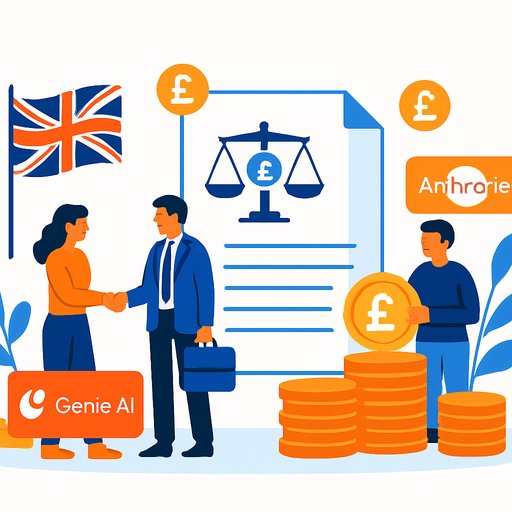Legal AI closes a £950k seed round: what this signals for UK legal teams
AnthroTek has completed a £950,000 seed round using Legal AI rather than traditional law firms, trimming legal spend by roughly 90% and compressing turnaround from weeks to days. The company used Genie AI's £30-per-month plan to draft, review, and negotiate the full set of funding documents.
For early-stage companies, this re-routes tens of thousands of pounds back into product and hiring. For legal teams, it's a clear message: standard work is getting automated, and clients will expect faster cycles and transparent costs.
Deal snapshot
- Round size: £950,000 (part of £1.15m raised to date)
- Valuation: £10.5m pre-money; further £550,000 tranche expected within 12 months
- Documents handled by AI: shareholder agreement, articles of association, term sheet, subscription agreement; plus MTA, IP assignments, and NDAs
- Cost shift: quoted £15k-£20k by multiple UK firms vs. £30/month plan
- Time shift: weeks to days, with founders retaining control of the process
Why this matters to legal
Seed-stage legal costs in the UK commonly absorb 2-5% of capital raised. Priced equity rounds often run £10k-£100k, and investor-side fees can push totals far higher. Much of the 50-60 billable hours typically logged at ~£350/hour are spent on repeatable tasks.
By automating drafting, review, and negotiation on standard terms, AI removes friction and cuts rework. Capital deploys faster. Legal's value shifts from production to oversight, risk calls, exceptions, and negotiation strategy.
What the principals said
"We completed a complex set of documents in a fraction of the usual time, and with minimal to zero external legal spend with Genie AI," said Nazmus Tareque, Co-Founder and CCO of AnthroTek. "Genie also handled our Material Transfer Agreement, IP assignments and NDAs. The market will show no loyalty to traditional legal services if AI systems keep generating more value for the dollar spent."
Rafie Faruq, Co-Founder and CEO of Genie AI: "Startups all over the world no longer have to pay £20-30k to do their investment deals. These fees are ridiculous-especially when lawyers are making tweaks to what are essentially standard templates."
Nat Wei, Baron Wei, Member of the House of Lords: "Wider access to legal support is essential to the future of UK entrepreneurship. Autonomous legal agents offer a practical alternative in fundraising-scalable, cost-efficient, and capable of reducing the barriers of time and cost that constrain growth."
Practical moves for in-house and law firm teams
- Define the AI scope: Term sheets, subscription agreements, and standard SA/Articles are prime candidates. Reserve human review for non-standard prefs, investor side letters, and unusual cap table situations.
- Adopt vetted templates: Anchor on recognized models and update your precedent bank. For example, review the UK's model articles of association from Companies House here.
- Set redline thresholds: Route AI-drafted docs to counsel when protections, liquidation waterfalls, anti-dilution, or board controls deviate from policy.
- Create playbooks: Clause-level guidance, fallback positions, and negotiation notes that an AI agent can follow-and your team can audit.
- Build an audit trail: Keep version history, decision logs, and rationale for material changes. This helps with investor diligence and internal compliance.
- Safeguard information: Lock down access, scrub sensitive data, and confirm vendor posture on confidentiality, encryption, and data residency.
- Align with investors early: Share your template set and positions up front to reduce cycles on predictable issues.
- Wire up filings: Confirm cap table integrity and prepare Companies House submissions in sync with completion mechanics.
Where human counsel still earns the fee
- Non-standard terms: bespoke investor rights, complex liquidation stacks, MFN provisions.
- Cap table edge cases: SAFEs/convertibles with unusual mechanics, cross-border SPVs, secondary transfers.
- Regulatory and tax: EIS/SEIS, FCA touchpoints, data/IP assignments with jurisdictional quirks. See HMRC guidance on venture capital schemes here.
- Disputes and negotiations that hinge on judgment, leverage, and precedent beyond templates.
What to do next
- Map your seed-round workflow end to end; mark tasks that are repeatable vs. judgment-heavy.
- Run a supervised pilot on a clean, template-friendly round; measure time saved, changes by clause, and error rates.
- Update engagement models: fixed fees for standard work, premium for exception handling and board-level advice.
- Upskill your team on prompt strategy, clause diagnostics, and AI review patterns. Curated options by role live here: AI courses by job.
The signal is clear: founders will default to faster, cheaper, adequate-first legal. Legal teams that productize their playbooks, supervise AI, and focus on judgment calls will win the next cycle of startup work.
Your membership also unlocks:






